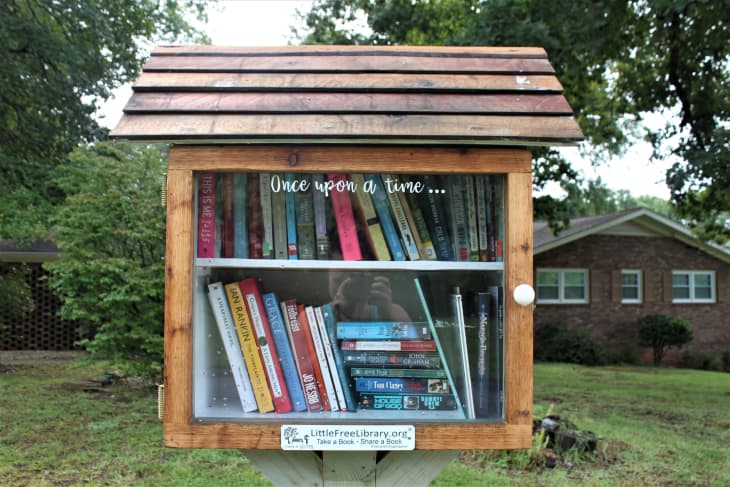Little Free Libraries Helped Me “Meet” My New Neighbors During This Strange Year

In May of this year, a few months into quarantine, I moved into my first home in the Atlanta suburbs. It was in a neighborhood not unfamiliar to me. In fact, I grew up nearby—and my grandmother still lives across the street. But I moved away before I learned to drive, never memorizing the back streets and shortcuts. So I did what I’d done in past places I’ve lived: I explored on foot.
Each day, I tried to navigate a new street while walking my dog. Where I live is made up of dozens of interconnected neighborhoods built over time—with every decade came new building styles, so the homes are a mishmash of brick ranches, pastel-colored stuccos, and contemporaries.
On my walks, as I admired the range of residential architecture, I also admired another type of house: Little Free Libraries. I’d seen them all over Atlanta and thought it’d be fun to build my own, but when I looked at the website’s official map, it turned out there were already a handful nearby. Naturally, I decided to seek each of them out.
I’ve since found half a dozen outposts of these free book exchanges, each with its own personality and selection. Without them, I would never have been able to “meet” people in my community during such a fraught time.
I quickly learned my neighbors’ reading tastes, sorting through their small boxes of discarded books. In one, I nabbed a copy of “Normal People”, tearing through it in a week, alongside “Born a Crime”. In another, I found Dan Brown paperbacks and a nice selection of children’s books.
At a nearby pizza joint, a library built in the shape of the Empire State Building stocks kids’ books to keep them entertained while waiting for takeout orders. One day, when I went to peruse the selection, a fellow neighbor patiently (and safely) gave me space to browse until I left so he could look for himself.
The tiny wooden houses filled with books are one way of learning about the people who live in the much bigger homes behind them. But each library also takes on the personality of the person who installed it, with varying colors and designs. According to Little Free Library’s official website, there are also no hard and fast rules about what your library can look like (unless your neighborhood association has some) so building one is a chance to express your creativity. I’ve seen one in the shape of Doctor Who’s Tardis and one resembling a covered bridge. A library not far from my house is painted white with a decorative iron handle, while another has a shingled roof with stickers reading “Once upon a time…”
These Little Free Libraries are also the perfect way to strike up conversations with a masked stranger from a distance. Once, when I spotted a library’s owner checking her mail, I chimed, “I love your Little Free Library!” She replied cheerily, “I’m glad! I hope you use it.” “I’ll bring some books by soon,” I promised, thinking of my overstuffed shelves at home.
Since the pandemic began, the book exchanges have been a lifeline for me and my neighbors, especially since our public library didn’t open until recently. These community boxes don’t require social distancing or temperature checks, just a quick wipedown of your title of choice. There are no set hours and everything is on the honor system, so it’s up to you to leave a book in exchange. Respect for your neighbor’s space is also important.
Over the past few months, some of my neighbors have even turned their libraries into makeshift food pantries for people in need. Others have stocked the boxes with books by authors of color. In all the forms they’ve taken on, the Little Free Libraries near me have brought people together in a sense, especially when it feels like everything is trying to divide us. Beyond conversation starters and personality indicators, Little Free Libraries find common ground—a precious commodity, pandemic or not.